WWE Fastlane, Main Event Tags & Okada vs. TNA | Hulbert’s Weekly Match Guide 10/10
We’ve been spoiled as of late, but all good things come to an end. That’s dramatic, I’m sorry, but this isn’t the strongest week for a venture as nerdy as this. Even still, there’s some good action as always, with Athena adding another defence to her glorious reign as World’s Champion. WWE Fastlane is the week’s biggest show, kicking off in style before falling away some afterwards. Elsewhere, Miyu Yamashita and Mizuki produce the guide’s finest, meeting for TJPW’s Princess of Princess Title.
As usual, AEW is in attendance also, as Bryan Danielson remains in unmatched form while at Sumo Hall, IMPACT and NJPW duel for NEVER Openweight gold. Finally, WWE’s Tag Team Titles continue to steer the ship, with an all-star main event closing RAW. Even without the recent classics and epics, there’s always graps to discuss and with that, let’s head to everyone’s favourite Honor-based streaming service!
Athena vs. Leyla Hirsch (ROH on HonorClub)
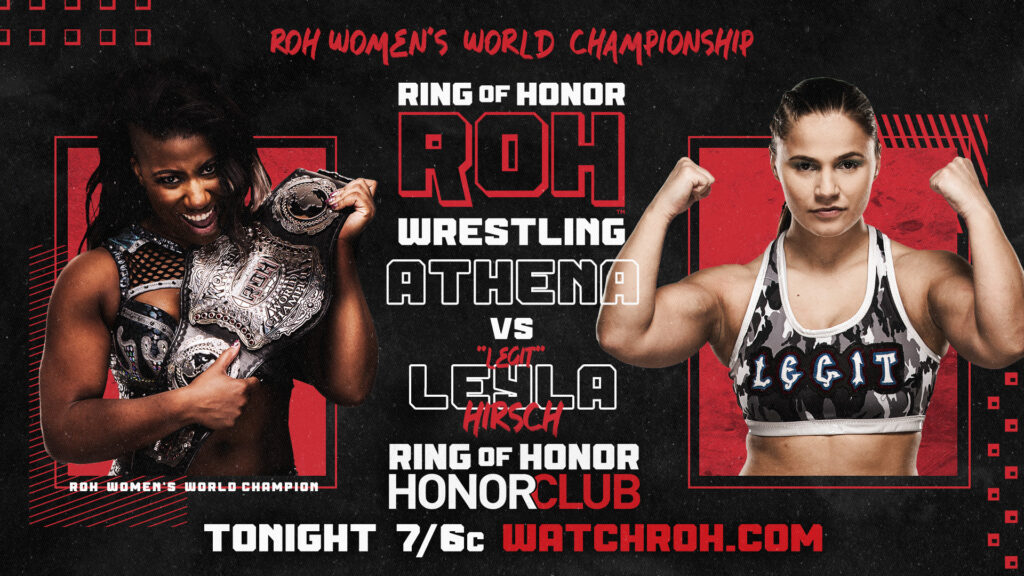
In June, ‘Legit’ Leyla Hirsh returned to the ring after over fourteen months on the shelf. That injury was especially frustrating, as Hirsch had made a surprisingly smooth transition to her emerging heel status. At the time, I didn’t love that decision, with Hirsch’s game allowing her to thrive as a natural underdog babyface. On sheer aggression though, she was able to adjust, maintaining her television role until the ACL tear.
Thus far, Hirsch’s return has been an HonorClub exclusive, dominating ROH while rejecting Maria Kanellis’ guidance. Kanellis has been scouting talent, getting Cole Karter onboard while also pursuing Griff Garrison and Hirsch. The latter hasn’t been swayed, remaining in the win column and earning a shot at The World’s Champion. Since defending her belt at Death Before Dishonor, Athena has shifted her focus to Billie Starkz, still making title defences along the way.
Starkz is Athena’s “minion in training,” somehow producing the rare species of genuinely funny wrestling skits. This is her first truly notable title tilt since the PPV main event with Willow Nightingale though, meeting Hirsch in a first-time matchup. It’s a dynamic that doesn’t require much navigation or negotiation, quickly producing a physicality that defines this match. The formalities are brief, with Athena winning one wrestling exchange, unleashing Hirsch in the process.
That’s an interesting element, as it feels as though the challenger is setting the tone in that regard. Against Hirsch, the champion is forced to play catchup in terms of aggression, being chased to the floor by Hirsch’s desperate dive. In an instant, Athena embraces that challenge, raising the bar via violent shotgun dropkick. They then use the steps for a nice set piece early, escalating the bout with momentum swings in that domain, resulting in a heavy suplex to the floor.
It’s a brutal spot but one that shapes the next portion, with Hirsch’s extended sell allowing things to breathe. This slows the pace for a moment, positioning Athena to steer the ship while Ian Riccaboni explores the boxing career of Peter McNeely. He does this in order to provide an example of an unprepared contender, delighting Caprice Coleman in the process. Before long though, the action returns to its initial form, as Hirsch brings her submission game to the party.
That ultimately serves as a hope spot, with Athena clobbering her way back ahead before grabbing a hold. Hirsch’s portrayal has been somewhat vague since returning, but she’s mostly leant heel. Here, she’s the match’s babyface, playing that aforementioned underdog role opposite the ultimate bully heel. They are both so efficient in those roles that the live crowd is swiftly onboard with their direction, embracing this narrative to a level beyond the norm.
It’s not rocking by any means but they’re with it, which is seldom the case on HonorClub. As they race towards a finish, the offence only improves too, building on that excitement with some explosive offerings. Athena is just about unmatched in that department but Hirsch noticeably belongs, pairing some innovation with the direct thud of her lariat. The quality of work here is engaging enough, let alone with that underlying babyface – heel dynamic.
Athena levels up in response to Hirsch’s efforts, timing a sharp finish in which she kicks her challenger out of the air. This is a terrific twelve minutes, packed with bad intentions and spite, another hit for Athena’s remarkable 2023 campaign. As usual, she’s superb here but Hirsch has a big time showing, reiterating her potential opposite the territory’s best. Very good match with frequent flashes of greatness, a tremendous piece of television wrestling.
Bryan Danielson vs. Kyle Fletcher (AEW Collision)
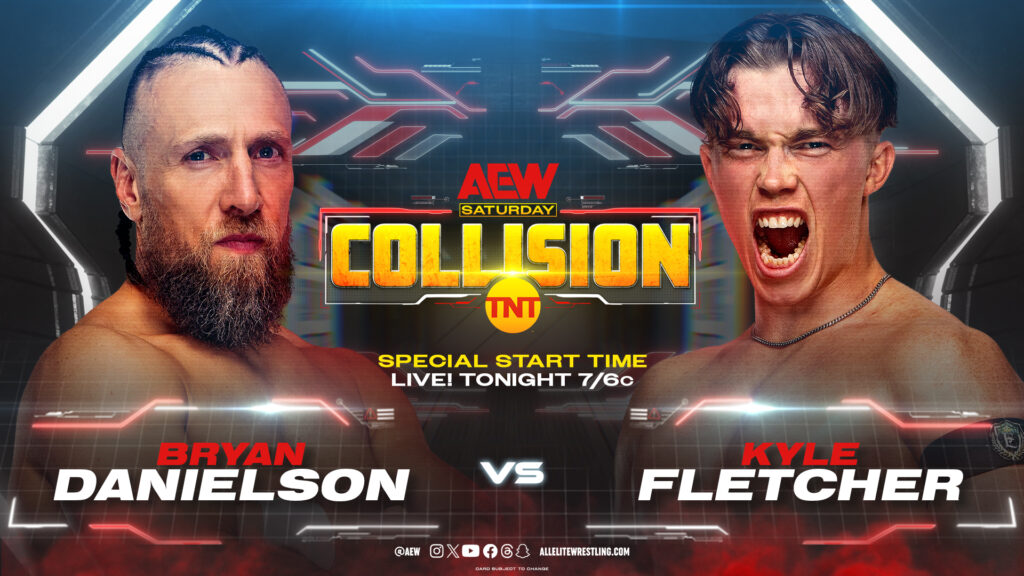
Earlier this year, an injury to Mark Davis slowed Aussie Open’s emerging Tag Team of the Year campaign. In his absence, Kyle Fletcher went to work as a singles, producing mixed results against a range of opposition. To my eye, he seemed most comfortable in shorter bouts, neatly transferring his skillset to virtual shootouts with AR Fox and Tony Deppen. I wasn’t as keen on his International Title tilt opposite Orange Cassidy however, which highlighted the relative holes in his game.
At 24 years old, those flaws are understandable too, with Fletcher still finding himself outside of those more dynamic offensive bursts. That’s a common hurdle to overcome and unfortunately, another Davis injury will provide him with the chance to do so. It’s an opportunity that’s re-emerged far sooner than anyone would’ve hoped, with Aussie Open hitting another roadblock after recently becoming AEW television regulars. Nonetheless, Fletcher can only make the best of a bad situation.
His return to singles competition was a substantial opportunity also, meeting Bryan Danielson on Saturday’s Collision. Danielson has been superb since returning at All Out, instantly regaining the form that stole shows weekly to kick off 2023. He’s noticeably motivated here too, visibly excited to spotlight Fletcher’s potential. At core, that’s really what this match is, serving as a Fletcher showcase first and foremost, getting Danielson a television win in the meantime.
Those highlights are neatly placed throughout, as Fletcher steals the headlines with some spectacular offensive range. Danielson also brings the best out of Fletcher elsewhere, testing his technique early and grounding the bout in doing so. He shows more aggression than usual too, whacking Danielson throughout and generally wrestling with the ferocity that I associate more with Davis. He has no choice on that front in fairness, as Danielson remains an animal here.
Once Fletcher fully takes over though, he shows noticeable improvements on his performance against Cassidy. There’s more poise to his pacing, working the crowd nicely but always giving Danielson something to sell along the way. His offence belongs more than I had anticipated, which positions this to succeed as Danielson only levels up in response. Structurally, this is mostly standard television wrestling but the work’s quality really unlocks its potential.
It’s a very good match that reiterates Danielson’s infinite value. When Danielson steps away from full-time competition, the dream matches will probably remain, with quarterly classics still emerging for a while I’d imagine. These are the matches that AEW will miss most though, as Danielson puts some time in with a young wrestler, testing his mettle in the process. Fletcher had clearly improved to begin with but he visibly grows into this match, thriving on the physicality.
This is, by a distance, the performance of Fletcher’s young career thus far, highlighting his ceiling against the world’s best. Speaking of such, Danielson remains prolific, extending his flawless 2023 campaign with a throwaway television bout that greatly exceeded expectations.
Cody Rhodes & Jey Uso vs. Damian Priest & Finn Balor (WWE Fastlane)
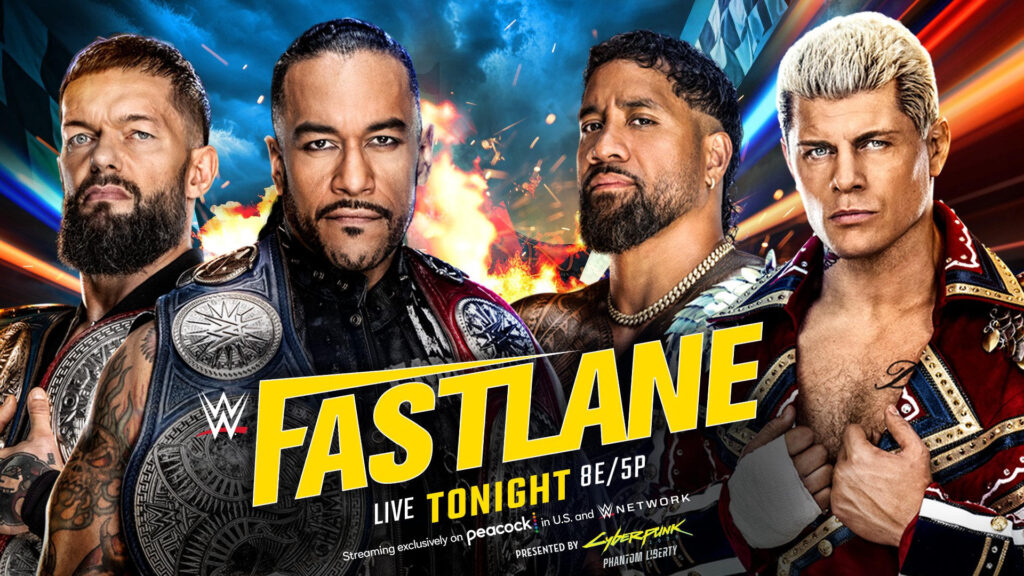
Since Jimmy’s betrayal at SummerSlam, Jey Uso has maintained his place as a central character. His road to redemption has been the centrepiece of recent RAW programming in fact, setting the stage for Fastlane’s opener. Seemingly on the way to a WarGames match, The Judgment Day entered their first PLE as Tag Team Champions, meeting Uso and Cody Rhodes. The latter has been Uso’s main supporter, bringing him over to Monday nights at Payback.
On an admittedly thin lineup, this match jumped off the page for me, going back to that increasingly familiar main event tag match formula. These belts have been pivotal to WWE’s 2023, playing their biggest part in the promotion since, well, possibly ever. Last month, The Judgment Day’s title win just about stole the show, rocking Pittsburgh with a Steel City Street Fight. Their sequel with Kevin Owens and Sami Zayn was also terrific, closing RAW in grand fashion.
This is another hit for the faction’s emerging catalogue, though one that’s noticeably different to either of those matches. While they are certainly in attendance later, this isn’t quite as reliant on the chaos or shenanigans, mostly operating as a traditional tag bout. They have the time to make that play call work too, using their twenty minutes for a gradual build that capitalises on its opening spot and takes the engaged crowd for a ride.
In fact, it feels like the kind of tag team tilt that would’ve closed an early Collision. Make of that what you will, your mileage may vary, etc. The work here isn’t particularly strong, in truth, especially early. Priest and Uso aren’t the most dynamic combination while Balor and Rhodes are so smooth together now that it almost veers too far in that direction. It’s a fresh crowd though and they’re ready to react, embracing Uso’s early tactics and responding to Rhodes with adoration.
They do develop something notable in that initial portion, targeting Priest’s leg in an idea that while undercooked, does prove pivotal. There’s a hint of heat on Uso early, then expanding into a prolonged segment. It arrives after a fabulous cutoff, as Priest’s blind tag allows him to floor Uso via head kick. The heat itself isn’t much, benefitting from the fresh crowd as they earn drama with a pretty minimalist approach.
Rhodes’ eventual hot tag is worth the wait regardless, swiftly giving Indianapolis something to cheer. That transitions the match to its second half, reiterating Priest’s weakened leg in the process. It’s effectively a ten minute finish from there, with Rhodes’ delayed superplex launching Uso’s own hot tag. After a diversion or two, that produces another superb save from Balor, saving the match until those aforementioned shenanigans arrive.
As usual, it’s wonderfully well done, forcing Rhodes’ own save before an immense false finish from Rhea Ripley’s interference. Along the way, they share the standoff that’s required from all multi-man matches beyond ten minutes long but in fairness, it remains a hit with those in attendance. Finally, that fleeting work on Priest’s leg pays off, as JD McDonagh’s interference backfires, allowing the babyfaces to kick Fastlane off with a surprising triumph.
This is not a great match, falling well short of last month’s Street Fight and even failing to match that recent RAW main event. With that being said, it’s a really good time that particularly suits my taste. Even as the opener, it’s an extended main event tag, allowing things to breathe and unlocking a simple structure with sheer star power. Physically, they’re almost certainly capable of better but this is a hit regardless, reaching that destination in comfortable, slick fashion.
This crowd-pleaser set a standard that for my money, Fastlane’s other matches were unable to reach.
Seth Rollins vs. Shinsuke Nakamura (WWE Fastlane)
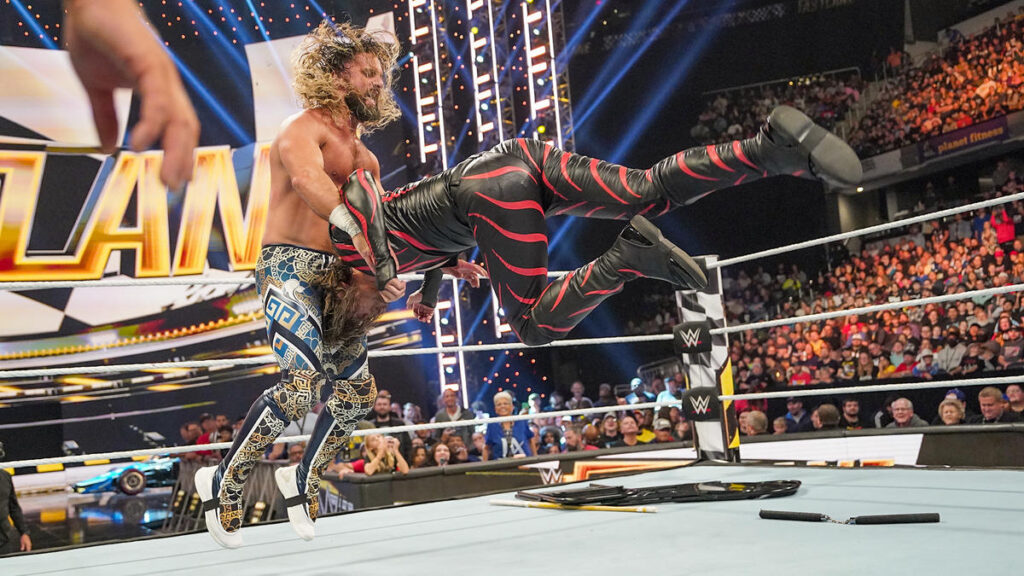
One month removed from their Payback main event, Seth Rollins and Shinsuke Nakamura combined to close another PLE. To their credit, WWE had managed to revive Nakamura as a main event threat, even if only for this particular programme. Some fans certainly seemed convinced that Nakamura could win on Saturday which considering his usage in recent years, is a feat worth recognising. That process was assisted by a build about Rollins’ injured back, providing the rivalry with a hook.
Unfortunately, this sequel arrived with a surprising stipulation, running it back in a Last Man Standing match. That seemed like a strange choice to me, though it also presented a shortcut or two. WWE has a very pronounced formula with these plunder main events and while that route feels like an unusual fit for both champion and challenger, it does provide a steady enough floor. On content alone, these usually reach their destination, even with some misses surfacing along the way.
Overall, I think that’s a mostly accurate description of this match too, though it’s a rougher example than you’d hope for. At almost half an hour long, this thing is stretched to its absolute limit, reiterating the self-inflicted wound of a five match show. This bout certainly isn’t without highlights and there’s some good stuff hidden within the wider haze, especially late. As a complete product though, it’s enough of a slog to detract from those positives.
The runtime’s excess is most noticeable early, as Nakamura wrestles a tactical match, loosely targeting Rollins’ injury. An awful lot of space emerges in the process, as Nakamura keeps his distance while chipping away. Considering that direction, it’s an intentional element on some level but even early, it’s extreme, with Nakamura watching on as Rollins collects a shopping list worth of weapons. Regardless, the challenger soon takes over for good, unveiling the bout’s biggest issue.
With Rollins’ injury serving as a central thread, Nakamura is tasked with an amount of space that frankly, his work is just unable to fill at this point. I know a lot has been made of Nakamura’s effort and motivation in this run, but I don’t think that’s the issue here at all. It’s apparent to me that he’s trying his best to maximise this moment, his game has just steadily declined. There’s minimal snap to his early offerings, undercutting the danger that they’re attempting to portray.
Rollins isn’t exactly Bryan Danielson in there either, unleashing a kendo stick salvo that fails to increase the live crowd’s excitement. That weaponry does help both parties though, especially as they enter the second half. Either way, the match is undeniably more interesting when Rollins is in control, adding some offensive variety as the bout’s babyface. His flurries breathe some life into proceedings, though they soon settle into a rhythm that limits that escalation.
This is a common issue with Last Man Standing matches, as single shots or stunts earn a count. That’s not illogical by any means, it just halts the momentum. Before long, there’s more time for the setup and outcome than any actual action in-between. Their extended walk and brawl doesn’t exactly break from that pattern either, lacking much spite as they wander to a spot that should’ve been left on the cutting room floor.
That false finish puts Nakamura back in control, returning the match to its original problem, though it’s concealed some by the increasing furniture. With that, the issue transfers over to Rollins, who sustains an absolute onslaught as they near the finish line. He registers every blow and commits more than usual to his sell but again, that runtime is swiftly an issue. It feels like for the final third, Rollins is constantly staggering upright at 9.
He quickly leaves himself with no rungs to climb, selling with such theatrics early that it almost feels redundant late. That’s especially apparent once Nakamura’s mist isn’t enough to close the show, merely earning that same stagger instead. To their credit, it’s a serious effort from both men and they go far enough in that direction to earn some drama, even willing this to an eventual approval from Indianapolis. On sheer quantity, the second half is a noticeable improvement on that initial chunk.
The slower opening act does allow for some genuine escalation also, layering some decent ideas on top of one another late. Certainly, there’s an engaging enough fifteen minutes or so in here but at half an hour, I found this to be incredibly bloated. Everything is so spaced out, limiting the match’s attempt at violence or grit. From the stipulation and WWE’s formula to Nakamura’s decline and Rollins’ selling, it’s a combination of terribly unfortunate ingredients, frankly.
That final push in the last portion is enough to make it passable but it settles there for me, landing just as far from bad as it is from anything truly good. In fairness, this was probably destined to frustrate me on some level but my goodness, a collection of choices were made here that I can only describe as baffling. This is a bizarre usage of both champion and challenger, actively exposing the latter’s increasing limitations.
Again, not bad necessarily but mostly middling in my view, closing a thin PLE in fittingly flat fashion.
Miyu Yamashita vs. Mizuki (TJPW Wrestle Princess 4)

In March, Mizuki became TJPW’s Princess of Princess Champion, defeating Yuka Sakazaki to close Grand Princess. That was one of the year’s most dramatic and emotional main events, as Mizuki dethroned her friend and tag team partner to take the gold. In fact, I’d say that it actually went too far in that direction for my personal taste, though I thoroughly enjoyed Mizuki’s most recent defence. That came in July, sharing a mostly traditional main event with Maki Ito.
Her latest challenger is Miyu Yamashita, who won this year’s Tokyo Princess Cup after years of falling short. Along the way, she eliminated Mizuki, making a statement on the tournament’s opening night. That was their fifth singles match, giving Yamashita a 3-2 lead in those encounters. The most famous of those matches came on last year’s January 4th show, with roles being reversed as Yamashita defended the same title against Mizuki, remaining champion during her third reign.
Either way, this is a treat, and comfortably better than anything on the weekend before it. It’s a main event built around the central stylistic clash, with that contrast present throughout. Mizuki has an obvious speed advantage, frequently overwhelming the challenger while Yamashita is armed with knockout power. That dynamic adds subtle depth to each exchange, establishing a palpable danger as Yamashita launches some frightening kicks following the opening sequence.
In response, Mizuki immediately ups the pace, earning some distance only to be kicked off the top rope. That’s Yamashita’s first notable success, setting the tone as she looks to make each strike count, relying on timing to slow Mizuki. She’s vicious on the floor, landing a brutal slam before throwing further kicks, targeting the back. That element isn’t exactly central for long, but it does position Mizuki as the bout’s emerging underdog, which really unlocks her performance.
Her responses feel fittingly desperate as a result, exploding in bursts as she wrestles for control. Those flurries include a frantic dive, as well as the middle rope foot stomp. Speaking of such, there’s an actual struggle for that position, with Yamashita actively fighting the attempt off. It’s a minor thing, but helps with the broader picture they’re painting, which is an increasingly scrappy affair. Mizuki’s success weakens Yamashita’s mid-section, levelling things up on that front.
Both wearing those wounds, they trade strikes in centre ring, settling for a brief double-down along the way. At one juncture, Yamashita holds Mizuki in position, uncorking knees before bringing her off the middle rope with a heavy slam. They operate at such a pace early that there are believable false finishes after just ten minutes or so, yet it never feels excessive or wasteful. Mizuki is a force of nature in that regard, wearing suitable anguish on her face throughout.
Even as they’re racing to a potential finish, it feels grounded in what’s already occurred, visibly effected by the blows they’ve sustained. As they cross the halfway mark, it threatens to become one-way traffic, with Yamashita going through the gears as Mizuki needs multiple attempts to even find a retort. She’s incredibly persistent though, even shaking off a headkick at one point, snatching a crossface for an extended submission spot.
For much of the second half though, it feels as though Mizuki is merely delaying the inevitable, being increasingly effected by the challenger’s strikes. I don’t think this quite reaches the absolute top tier that either wrestler is capable of, but it’s awful close. This is a worthy main event for any show, pushing a serious pace without sacrificing the prestige you’re pursuing with these headliners. The week’s best singles match, by a distance too.
Hiroshi Tanahashi, Kazuchika Okada & Tomohiro Ishii vs. Josh Alexander & The Motor City Machine Guns (NJPW Destruction)
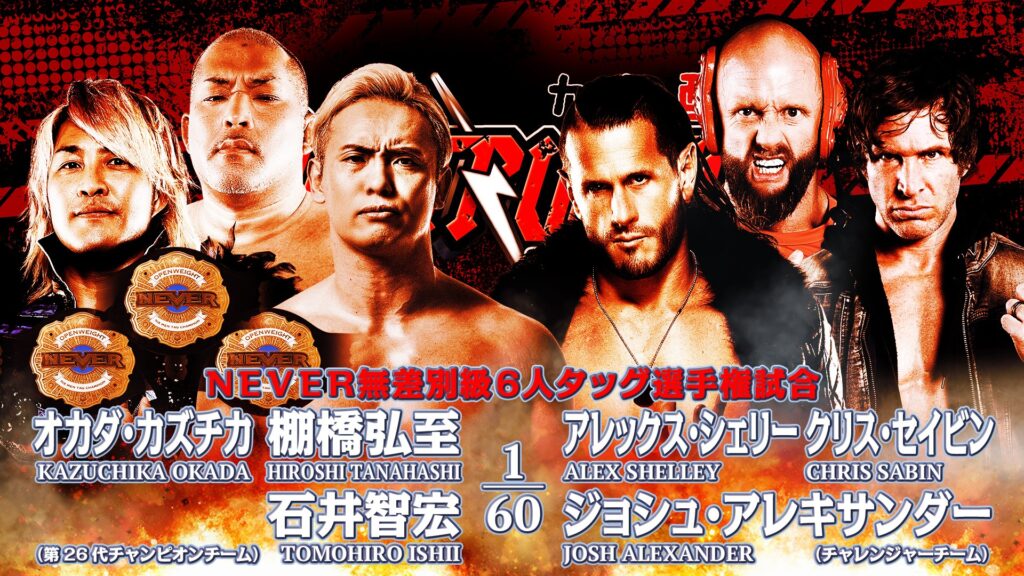
Twelve years removed from his TNA excursion, Kazuchika Okada is finally armed with a chance at revenge. Defending the NEVER Openweight Six Man Tag Team Titles alongside Hiroshi Tanahashi and Tomohiro Ishii, the all-star trio would meet IMPACT’s finest, with Josh Alexander accompanying The Motor City Machine Guns. In August, Alex Sheley defeated Hiroshi Tanahashi in a career-best win, maintaining his IMPACT World Title in the process.
Alexander managed the same against Tomohiro Ishii in 2022, though Okada is the actual story in truth. Those other pieces of history add slight depth to the dynamic, providing some context to different pairings but ultimately, this is Okada vs. TNA, as that’s simply the funniest way to frame this match. Jokes aside, it’s a genuinely neat moment, with Okada standing opposite two of his biggest supporters during that excursion, now doing so as the promotion’s immovable ace.
Considering their struggles a decade or so ago, it’s remarkable that Sabin and Shelley are still rolling at all, let alone on a stage such as this. It was almost fourteen years ago that they first worked New Japan together, claiming tag gold at the Tokyo Dome to boot. They remain silky smooth, with Shelley and Tanahashi sharing a neat opening exchange to set the tone. Shelley is the ideal foe for this ageing version of the great man, testing technique and skill more than anything else.
Anything beyond that is handled gracefully too, positioning Tanahashi to succeed. No such grace is needed for Alexander and Ishii’s duel, with the former shining bright in his Japanese debut. In an instant, he feels at home in this setting, making the most of his time before Okada’s dance with Sabin. It’s an incredibly selfless opening from Okada, mostly showcasing Sabin which is quite the sight anywhere, let alone in Sumo Hall.
The match isn’t assisted by a great deal of heat early but as the action becomes more dynamic, they quickly get Tokyo onboard. Sabin and Shelley set the tone in that regard, with Alexander soon getting in on the action. The IMPACT squad takes a brief control segment from there, working over Okada of all people until Ishii’s hot tag. It’s immense, because of course. That momentum shift builds upon the bout’s emerging intensity, giving this a palpable grit as it crosses the halfway mark.
That’s especially present as Alexander turns the tide, halting Ishii’s momentum in ruthless fashion. The onslaught earns a headbutt in response, removing Alexander’s headgear along the way. Tanahashi’s own hot tag is launched from there, though it’s admittedly tepid, even with a gleeful feed from the Guns. Either way, it’s already rocking by that point, only climbing further as all six men overlap for some late sequencing. It’s familiar in theory but with this lineup, has an undeniable novelty.
The quality work is elevated by that novelty throughout, giving this a higher ceiling than the same match on a dingy “multiverse” show. I mean that with love, to be clear, this is just a different experience entirely. Regardless, the wrestling is tremendous, with IMPACT picking their best possible representatives for a major league trios such as this. Better yet, they manage to build their Bound for Glory main event some in the process, increasing the value of an inevitable finish after dominating the match itself.
This is a treat, doing an awful lot for IMPACT’s image while providing Monday’s Destruction with a show stealer. Terrific match, fifteen minutes of polished main event wrestling.
Cody Rhodes & Jey Uso vs. Kevin Owens & Sami Zayn (WWE RAW)
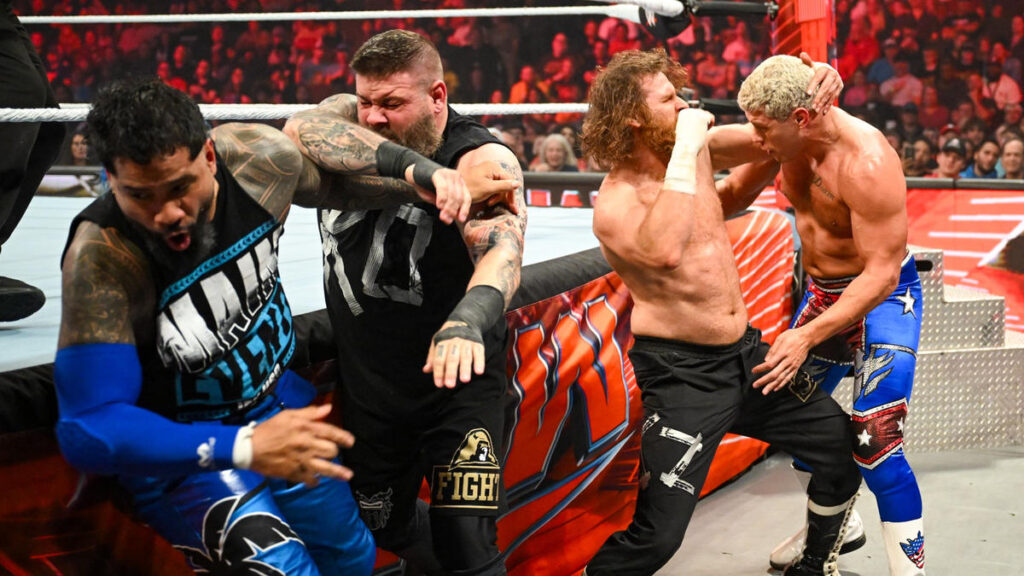
After stealing the show with their media scrum antics, Cody Rhodes and Jey Uso got right to work as champions, immediately meeting Kevin Owens and Sami Zayn for an all-star title tilt. I was stunned by this development, as this match felt almost too important for an impromptu RAW main event, which says a lot about the angle’s quality. Very seldom has any tag team match seemed too big for such a scenario in WWE, let alone one with four full time talents.
That angle shapes the match itself too, meaning that initially at least, it’s more about this particular story than anything athletically expansive. Thankfully, that’s a worthwhile approach too, as this arc has been genuinely compelling. As the neutral parties, or closest things to it at least, Rhodes and Zayn set the stage early. They share a clean wrestling exchange at the bell, establishing the laws of a babyface match before a chop duel escalates things in an instant.
Unfortunately, there’s an ad break immediately afterwards, robbing us of that natural evolution. Instead, we return to more action between Rhodes and Zayn, with Owens supposedly getting frustrated with his partner while we’re away. Michael Cole and Wade Barrett explain that Zayn had opted against taking a cheap shot, much to Owens’ chagrin. Sami adjusts accordingly, going right to work with a right hand on Uso, eating a heavy blow in response.
Even still, there’s a veil of caution and respect, which quickly dissipates upon Owens’ entry. He immediately roughs Uso up on their intense lock-up, raising the bar as they brawl to ringside. Rhodes and Zayn get in on the act to boot, creating a chaotic scene on the floor, with Owens transforming the match in a single minute. The brawl eventually slows, only to restart mere moments later, going into another break with a red hot hook.
From there, it’s far more familiar, with those ingredients fading into the background as the action takes centre stage. They return to an Owens hold, controlling Uso as the people get behind him. That loosely positions the champions as the match’s babyfaces, which seemed to be the right choice. Owens and Zayn are beloved in their own right of course, but Rhodes and Uso are the fresh act and more specifically, the tale’s natural protagonists.
As usual, Owens adapts seamlessly, embracing that role by providing his usual spite while restraining that always endearing fire along the way. It’s subtle, but really assists Uso’s sell job, also setting the stage for Rhodes’ hot tag. They reach that by going into a somewhat infuriating superkick sequence, which they return to later. Look, I’m sorry to be that old about things but The Usos’ superkicks are one thing, trading them like jabs is a step far for me personally.
Nonetheless, Rhodes runs wild on Zayn, launching a slick sequence that provides the bridge to their finish. That produces multiple near falls, including saves on both the Cross Rhodes and Owens’ Stunner. The finish itself is actually quite terrifying, as Rhodes lands dangerously high on his cutter. Either way, this is a very good match, though not quite the home run that I’d hoped for. It’s still better than anything on Fastlane, for my money, but I think this had a pretty special ceiling.
It doesn’t quite get there, exploring the story some but not quite maximising its potential. Instead, they head in different directions before settling on something more standard, which felt a touch wasteful. Perhaps that due to an oncoming sequel but there’s genuine depth here and in my view, this barely scratched the surface. Again, that speaks more to the angle’s quality than any true deficiencies with the match, which still very much delivers anyway.
This is a hard tale to tell under any circumstances, let alone a television main event that’s broken up by two breaks. Even still, they stick the landing well enough, closing RAW with an all-star main event that’s exciting throughout. It’s not the moving masterpiece that I suspected they may swing for, but it’s a capable thriller nonetheless.

